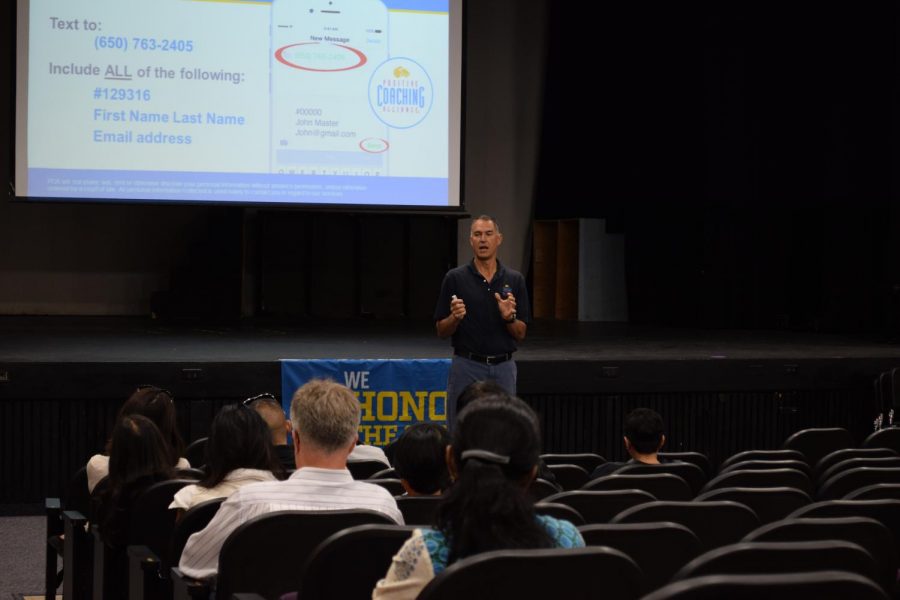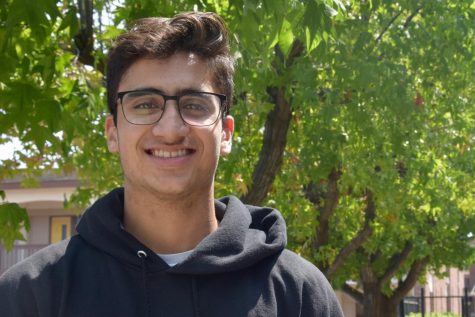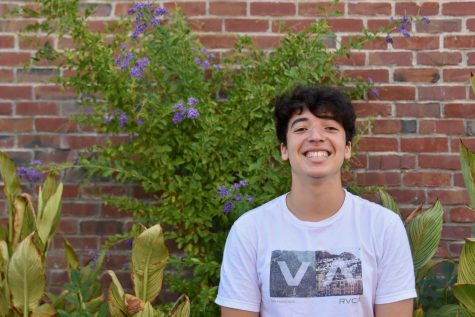Coaching parents: Peter Wood on supporting your student athletes
Parent and athlete conferences teach the importance of supporting ones child
October 3, 2018
On Sept. 25, parents of MVHS athletes trickled into the auditorium. All of them wanted to hear PAC, or the Parent Athlete Conference, representative Peter Wood share his thoughts about what role parents have in MVHS athletics. Throughout his presentation, he invited the parents to participate in various activities in order to help them understand the importance of communication. As the presentation went along, Wood talked about how its the parent’s job to support and encourage their child through difficult times.
“When kids see their parents crossover into a coaching mode, that relationship breaks down,” Wood said. “[A] child makes a mistake or loses the game or isn’t getting enough playing time, according to the parent, should not say a word, that is not their area.”
In most parent-athlete relationships, there is an over acting force that makes parents or supporters overly protective and that, in a way, can have a negative effect on a child. Wood said that it is better for a parent to give their child their space and only engage once the child is comfortable.
“When a parent acknowledges or identifies great teamwork, physical fitness, perseverance, bouncing back from mistakes, parents should [support] their child in those ways,” Wood said.
Athletic director Nick Bonacorsi believes that a parent has many different roles when it comes to supporting their child, but the biggest support that any parent can give is just simply watching them.
“Sometimes its parents that do not attend, [they] are not there to be a physical support,” Bonacorsi said. “As we build a different culture,the message gets to parents and [they understand] the significance of the role they play.”
Bonacorsi and Wood believe that it is the coaches responsibility to ensure that parents do not get in the way in their child’s athletic career.
“That’s certainly the coaches role. We tell them that in all our workshops, your job is to train the parent on how to be a sports parent,” Wood said.
From personal experience as well as studying the subject, Wood concluded that this type of coaching is effective and he is able to see the results. Wood believes that this coaching can improve the mental health of an athlete and grow the relationship between the athletes and their parents.
“When the coaches [are] coaching and the parent is parenting in the way that we talked about, we’re talking about happy fun kids,” Wood said.
Especially when it comes to school, there is pressure on a athletic and a academic level. It is necessary that parents be the support that will help them be successful in both athletics and academics.
“Our community does not know that we’re also highly successful athletically, compared to other schools that rank as high as we do academically,” Bonacorsi said. “There’s a lot of pressure on our athletes to do a lot, and that sometimes spreads them thin or gets in the way of their commitment.”
MVHS parent Saikat Saha believes that it is necessary for child athletes to enjoy the sport for them to manage it. Saha believes that sports teach children skills that will be needed later on in life.
“It really teaches you how to play in a team…when you go out after your school is over, teamwork is very essential in [a] workplace,” Saha said. “These are characteristics that will help you to succeed in the future. It’s really essential.”
Throughout the course of the presentation, Wood highlighted the importance of giving a child their space and how it is necessary it is to talk to children once they are ready to communicate. He emphasized the fact that most athletes do not wish to speak to their parents after their game and parents should respect that.
“When the coaches are coaching and the parents are playing their role, the kids are way happier, they have a lot more fun and the win losses don’t even play in with the feel and satisfaction of being on a team at that school,” Wood said.
Being a very enthusiastic parent, Saha believes that it is his responsibility to give his child space and not be emotionally invested in their sport. After the presentation, he understood what adverse effects that could have on a player and will try to limit his actions.
“One thing certainly I would like to avoid is to be critical, and analyze the game right after the game,” said Saha. “Coach Wood was talking about ‘self analyze’ and ‘self talk,’ I think this is really critical.”



















